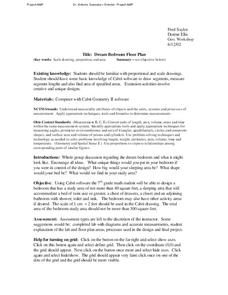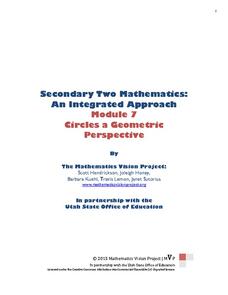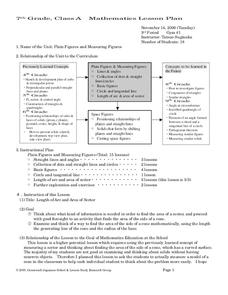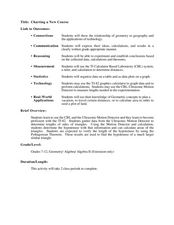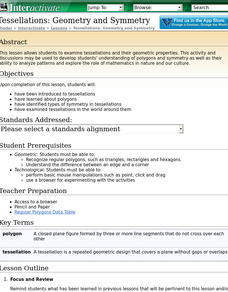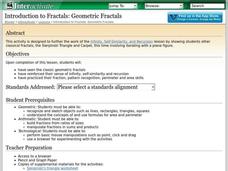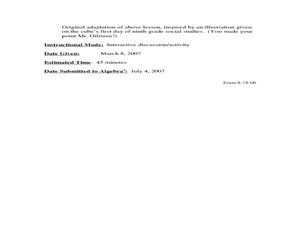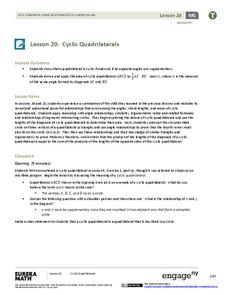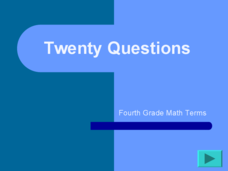Curated OER
The Dragon Curve Fractal
Students identify the properties of a dragon curve. In this geometry lesson, students identify sequences and patterns as they solve fractals. They investigate patterns found in nature.
Curated OER
Dream Bedroom Floor Plan
Students build and apply concepts of geometry. In this geometry lesson, students create a building using proportions and scale drawings. They use Cabri technology to create a virtual drawing first.
Curated OER
Dream Bedroom Floor Plan
Students construct using Cabri software. In this geometry lesson, students convert between units and apply the correct measurements to build objects. They create the room virtually and manipulate the shapes to the desired measurements.
Mathematics Vision Project
Circles: A Geometric Perspective
Circles are the foundation of many geometric concepts and extensions - a point that is thoroughly driven home in this extensive unit. Fundamental properties of circles are investigated (including sector area, angle measure, and...
Curated OER
Plain Figures and Measuring Figures
Students investigate basic geometric concepts. In this geometry lesson plan, students explore solids through measuring and modeling. This assignment models the importance of understanding concrete objects in geometry.
Curated OER
Charting a New Course
Students calculate the distance they will travel. In this geometry lesson, students use the TI and CBL system to make calculation of a certain path. They explore geography by calculating distances between different areas as it relates to...
Curated OER
Geometry and Symmetry
Students examine tessellations and their geometric properties. The lesson plan and discussions may be used to develop students' understanding of polygons and symmetry as well as their ability to analyze patterns.
Curated OER
Introduction to Fractals: Geometric Fractals
High schoolers explore the concept of fractals. In this fractals lesson, students discuss Sierpinski's Triangle using an applet. High schoolers discuss the patterns involved with fractals. Students discuss the area of Sierpinski's...
Curated OER
An Application of Congruence
Young scholars solve triangles using the properties if congruency. In this geometry lesson, students apply congruent and similar figures to solve real world and math problems. They show they are able to follow instructions.
Curated OER
Slope Right Up
Learners use triangles to find the length and slope of each side. After connecting the vertices, they add points based on their specific instructions. They use the Pythagorean Theorem to complete a worksheet to end the lesson.
Curated OER
Right Trianlges: Missing lenght
For this geometry worksheet, 10th graders use the Pythagorean Theorem to find the indicated missing side of a right triangle. The one page worksheet contains one problem. Answers are not provided.
Curated OER
Reflections
Students investigate image and pre-image. In this geometry lesson, students identify the reflection and rotation of different shape on a coordinate plane. They identify similarities and differences of image and pre-image of a reflection.
Curated OER
Find the Shape
Students identify points on the coordinate plane using ordered pairs and also plot the ordered pairs on the coordinate plane. They also use properties of shapes to identify polygons such as triangles and quadrilaterals
(square,...
Curated OER
Our Families, Yours, and Mine
Students study the similarities and differences in families and identify attributes in themselves and others.
Curated OER
Snowflake Curve
Students develop an appreciation for complex structures in nature. They observe patterns in nature in relationship to the Real World. Students use observation skills to assist in problem solving. They show comprehension of the concepts...
Curated OER
Shapes Are Everywhere
Third graders explore pattern blocks noticing their similarities and differences and share their observations with others. They classify shapes by discussing sides and angles and combine pieces to make new shapes.
Curated OER
An Introductions to Congruent Polygons
Learners differentiate between similar and congruent polygons. For this geometry lesson, students define the theorems and reasons for polygons similarity and congruence. They are given pictures and patterns to differentiate and identify.
Curated OER
Length, Perimeter, and Area
Students explore the concepts of length, perimeter and area. Students develop an understanding of length, perimeter, and area. Students calculate the area and perimeter of random shapes and calculate the area and perimeter of a triangle...
Curated OER
Cutting Corners
Second graders examine two-dimensional shapes using their characteristics. In this shapes lesson, 2nd graders identify similarities and differences by using cut out shapes, diagrams, mirrors, and graphic organizers.
EngageNY
Cyclic Quadrilaterals
What does it mean for a quadrilateral to be cyclic? Mathematicians first learn what it means for a quadrilateral to be cyclic. They then investigate angle measures and area in such a quadrilateral.
Curated OER
Measuring Angles
Third graders describe an amount of turn from a particular position to another using the 'circular' benchmarks of 0, ++, ++, ++, and full turn. Estimation language such as 'just about', 'between', 'not quite', 'just over', and similar...
Curated OER
Twenty Questions: Fourth Grade Math Terms
Questions related to math vocabulary from a large variety of categories for 4th graders are displayed throughout this Jeopardy game. Concepts covered include angles, shapes, computation terms, statistics, and place value.
Curated OER
Tantalizing Tangrams
Fourth graders participate in what is considered to be a model lesson. The lesson focuses upon polygons and basic geometry. The lesson addresses national standards and displays how others should be done.
Curated OER
Dilations of 2 and 3 dimentional figures and their effect on area, surface area, and volume.
Seventh graders investigate the area and volume of 2D and 3D figures. In this geometry lesson, 7th graders create a storyboard explaining their knowledge of 2D and 3D shapes. They analyze their data and interpret their results.



